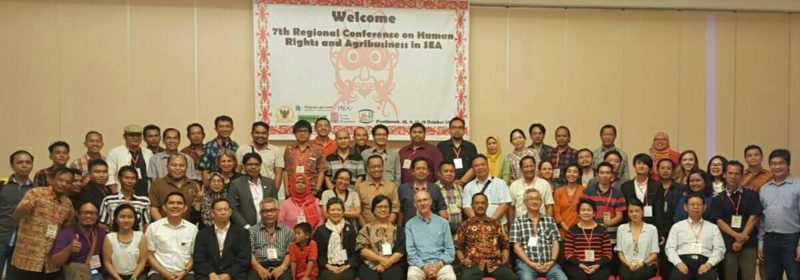The 7th Regional Conference on Human Rights and Agribusiness in South East Asia on Tuesday, October 24, 2017 issued a resolution calling for a range of measures aimed at securing real change in land tenure recognition and security.

The resolution calls for accessible mechanisms to map and register customary lands, to provide clarity of ownership. The resolution also called for a rethinking of the underlying business model of plantations to stop pressures on communities to surrender their lands, both by promoting alternative production models and alternative financing models.
The conference, which is the seventh in a series of annual conferences organised by Forest Peoples Programme in collaboration with the South East Asia National Human Rights Institutions Forum, aimed to examine progress made since the first conference in 2011 hosted in Bali where the declaration called for urgent steps to reform or reinforce national laws and policies relating to land tenure, agrarian reform, land use planning and land acquisition so that they comply fully with human rights obligations as defined under international law.
Participants also discussed methods of legal reform in order to establish binding obligations on human rights for companies as well as worker’s rights in South East Asia, and noted called on regional governments to set up monitoring and reporting systems, and citizenship provision, for the many tens of thousands of stateless children born into plantation worker settlements.
The conference also reiterated the importance of binding legal solutions to the significant challenges facing the agribusiness sector in South East Asia, not only through national legal reforms and effective enforcement of existing laws, but also potentially through the strengthening of the standards overseen by the regional human rights body – the ASEAN Inter-Governmental Commission on Human Rights.
Before the conference, some participants had the chance to visit Olak-Olak village in the district of Kubu Raya, West Kalimantan. The fact-finding trip was organised by Link-AR and Pusaka, with the aim of investigating the challenges faced by the Olak-Olak community and surrounding villages due to the expansion of palm oil in their area. The results of the mission were shared at the conference by community spokespeople and discussed further at the event.
Appalled by the significant intimidation, violence and high level of criminalisation faced by the community the participants of the conference, who represented many international human rights institutions and civil society organisations, signed a letter to Wilmar (a purchaser of palm oil from the area) expressing their serious concern.
